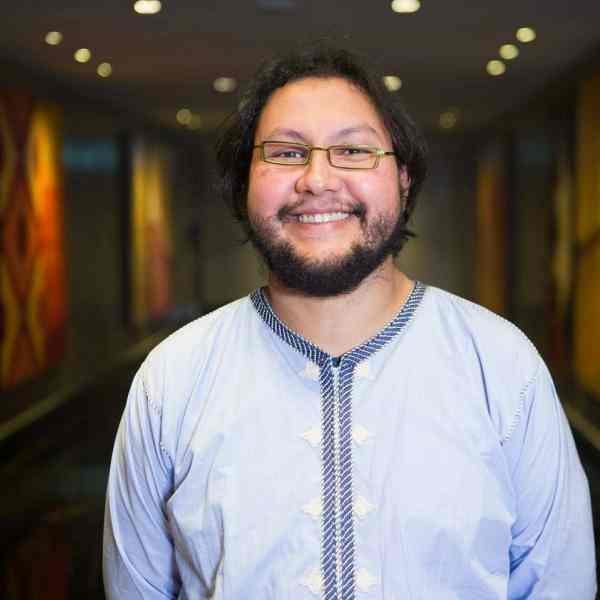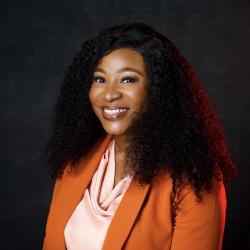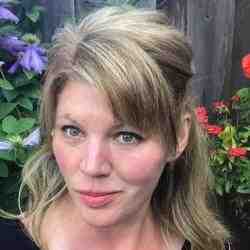Introduction
Adnane is enabling students, supported by their communities, to change public school education in Morocco.
The New Idea
Adnane is driving a more creative and innovation-oriented education system by equipping students to transform their schools through their own innovations. Through his initiative, Tamkeen, Adnane seeks to change the education system such that it produces innovative changemakers rather than vulnerable, unemployable young people. High school students develop the mindset of problem solvers as they launch their own solutions to challenges they identify in their schools. A three-module training in community, business, and personal development equips them with skills not provided by traditional education—such as creativity, communication, leadership, critical thinking, design thinking—as they collaborate with each other to create and develop their own projects. Student projects have included sustainable shower system where showers are provided with water that is recycled and delivered using solar energy powered turbines, and sustainable, environmentally-friendly libraries that are built using shipping containers.
Adnane seeks not just to transform individual student mindsets but to change the education system itself, which is why Tamkeen works directly in schools, engaging teachers, school authorities, and parents associations to create an enabling environment for the works of their students to thrive. It is also why the student projects focus on the schools themselves, empowering students to drive change in a system that isn’t working for them and to turn schools into spaces of innovation.
To enable scale and to sustain the change that he champions, Adnane engages the community as a key part of his methodology. By providing his three-module training to community NGOs, he drives a more innovative civil society while also positioning local NGOs across the country to lead Tamkeen’s work in the schools in their communities. Tamkeen and the local NGOs likewise engage a range of other business and community professionals as teachers and mentors in the project. Adnane is also building an alumni network so that former students become mentors for other students to carry on the movement. This mobilization of a wide range of stakeholders has led to inroads at the Ministry of Education, where Adnane is currently advocating for change across the entire school system.
The Problem
Morocco is suffering from a high number of unemployed youth that causes instability and risk on social, economic and political levels, where the youth are left behind with no education, training, or employment. Fresh high school and university graduates are not equipped with adequate skills (such as problem solving and analytical thinking) to enter the job market and have a passive mindset that believes that the government should get them jobs. A study by McKinsey unveiled that only 20% of Moroccan employers believe that employees they hired recently have been adequately prepared by their education or training. As a result, almost one in three young Moroccans is unemployed (28%, study by McKinsey). As such, the economic exclusion leaves youth frustrated, with little perspective and initiative, whereas the lack of perspective causes high risk of mental instability, violent radicalization and extremism. That is evident in the study conducted by The European Centre of Peace that argues that young Moroccans join ISIS for economic benefits.
The root of the problem is that the Moroccan educational system produces unemployable youth lacking the necessary mindset and skills for successfully entering the job market. The education system focuses on linear, passive learning methods rather than proactive methods delivering the entrepreneurial, innovative mindset that enhances the student’s self-empowerment which they need in today’s competitive market system. The focus is on linear, uncritical learning methods that are reinforced by education system prioritizing STEM subjects (Science, Technology, Engineering and Mathematics). The British Council argues in one of its recent studies, Immunizing Minds: Education and Extremism, that the over emphasis on STEM education as well as its methodologies produces students with a simplistic, uncritical mindset due to STEM teaching being dominated by “given facts with no room for discussion”. These linear mindsets hinder entrepreneurial outside the box thinking needed to be a change maker. More pressingly, a study by British Council revealed that such uncritical mindset makes educated youth highly vulnerable to follow violent radicalization.
The problem is not limited to Morocco. Several Arab countries, have realized that there is a severe problem with the existing schooling system and as a result have implemented more than 100 educational reforms. According to the Islamic Development bank, all of the reforms focused on the reinforcement of science and technology, failing to tackle the real problem of inadequate skill delivery, and restrictive teaching methodologies and patterns. On the NGO level, Injaz al-Arab (a well-known NGO in Morocco) promoted entrepreneurship in schools but through programs that just focus on delivering technical skill set to the students while overlooking their development as persons who need direction and motivation. Even Junior Achievement, which gave the license to Injaz al-Arab, capacitates the licensee with the training methodology that is given to student in schools while overlooking enabling the licensee to be more innovative and competitive on the organizational level. Other initiatives (such as iEARN) that are supported by the governmental body (MEARN) focus on equipping schools with technology as an education tool that is not well integrated with the adopted educational methodologies and the student personal development.
The Strategy
Adnane fosters a creative mindset and practice in schools focused on student-led innovation. He has developed a methodology and program to cultivate collaborative innovation by students within their schools. He engages all school stakeholders to make sure the methodology has a lasting impact on the entire school. And he embeds his initiative in the local community by using NGOs, businesses, and other community stakeholders to implement the initiative in collaboration with schools, a strategy that also serves to make the methodology quickly scalable.
Adnane’s methodology is aimed at enabling students to develop innovations for their schools through a 9-month program corresponding with the school year. He has developed an easily replicable three-module training program through which the students explore community, business, and personal development. In the community development module, they learn to do interviews and needs assessments and to understand the relationships between different challenges in the community. In the business development module, they create prototypes of solutions and then run the project they develop. In the personal development module, they develop their interpersonal skills and self-awareness, learning to understand themselves and their environment, to reflect on their purpose in life, and to design their own future. Everything in the program is geared at developing seven skills: Critical thinking, accessing and analyzing information, agility and adaptability, effective communication, leading by influence, curiosity and imagination, and initiative and entrepreneurship.
At the start of each 9-month program in a given school, 10 students are identified to be the core team. These 10 students are chosen based on the seven skills rather than on class rank and grades. They are responsible for recruiting 100 students (each student recruits 10 other students), who together lead the process of identification of problems in their schools and coming up with solutions with a concrete budgeting and time plan. To celebrate the start of the Tamkeen program in each school, an opening mini-conference is organized where parents, school administration, teachers and students are collected together to show the goals of the program and the change that this program is meant to realize. Before coming up with those solutions and even identifying problems, the 100 students participate in a three-module program that engage students in personal, business and community development. Each module develops specific skills in those students. The personal development module develops critical thinking abilities, accessing and analyzing information to make student better capable of doing research and synthesizing the right information to put their ideas into action, and curiosity and imagination through creativity-based exercises that trigger how students explore new avenues of thinking while approaching a problem. The business development module nurtures the abilities of the students to take initiatives and teaches them the qualities that an entrepreneur should have (such as learning how to seize opportunity, identify gaps, mobilize resources, and assess the outcome to scale work). The community development module develops agility and adaptability to be able to effectively deal with the different challenges that the community throws at its members, effective communication so that students learn how to communicate their ideas and listen to feedback, leading by influence in order to underscore the importance of empathy-based leadership that enables the students to be sensitive towards their team and community members, as well as the problems that they encounter based on their everyday experience. After engaging those modules, students then focus on identifying problems that they see from their perspective and this is an important milestone where students start to develop their own voice. The students start to develop solutions in teams that are led by the selected 10 students in the very beginning of the process. After coming up with prototypes, students present their ideas and solutions to the teachers seeking mentorship, guidance and support. Those teachers are engaged in the three-module training as well to be able to help their students and mentor their endeavors. Each Sunday, teachers and students convene so that students showcase their work and teachers offer their support.
Through the program, students have created innovations such as a school shower system where showers are provided with water that is recycled and delivered using solar energy powered turbines. That project increased the benchmark of hygiene in the whole school while minimizing the costs of sustaining such a system in the long term. Other students have built sustainable libraries using shipping containers. Libraries are now built using non-cement materials and are also movable, cutting down financial and environmental costs while replacing or renovating the whole library. In another school, where there were communication problems between the student body and the administration, students created an administration facility acting as a mini government to liaise between the students and the school administration. In addition, at a girls’ school, students partnered with Microsoft to design a revenue generating coding academy that offered training in programming skills for interested students.
Adnane’s primary aim is not the projects themselves but to create lasting change in the schools. Students move on but teachers and administrators remain. This is why Adnane mobilizes the other stakeholders inside the schools to create an enabling environment for students’ success in providing solutions to their schools problems, and to foster sustainable change in mindset and practice across the entire school. In addition to the 10 selected students, Tamkeen selects a lead teacher in each school to form an association of 10 teachers. That association is responsible for enriching the classroom environment and helping students in implementing their projects. To do so, teachers go through the same three-module program as the students and receive an intensive training in how to integrate creative and critical thinking in the curriculum. The teachers also provide technical mentorship for the students while they’re implementing their projects.
The school administration provides support to the students by extending the school working hours and providing the necessary human resources to help students undertake their projects. Tamkeen also engages parents by inviting them to the opening conference and to some of the trainings. Additionally, parent associations in the school play a key role as they convene with the school administration to listen to the impact that Tamkeen’s methodology had on their children. The parents are then encouraged to contribute their insights about their children that help the school administration better support innovations in schools. Parents’ consent on their children’s projects (as those projects demand students to stay after school for long hours) is a key element in enabling the student to lobby the school administration for granting them the necessary support (such as permission for staying after school, using the school resources like libraries and classrooms for example, and utilizing human resources).
Adnane builds a network of local NGOs to administer the whole process of implementation of Tamkeen’s methodology in schools in their communities. He first identifies the local NGOs based on credibility and trust. Adnane gives a version of the three-module training to the NGO staff, helping turn them into more innovative organizations. Personnel learn to understand the essential role of social entrepreneurship in solving societal problems in Morocco and how to deliver this message to others. The involved NGOs are also trained on handling the operations of implementing Tamkeen’s methodology in schools and on raising funds to finance those operations. Upon the completion of that process, NGOs are licensed to use Tamkeen’s methodology to work in schools. Each NGO can manage a total of 15 schools. The NGOs seek the permit from the government to be able to implement Tamkeen’s program in the schools and then recruit the 10 lead students’ school and one teacher in each school and manage the implementation. Tamkeen monitors the work to ensure quality control, support implementation, and address any problems. In two of the eight cities where Tamkeen operates, the managing NGOs are successfully running the program with very little support from Tamkeen. They are also beginning to innovate other initiatives, such as one NGO that is now working on career guidance in schools as well. After establishing connections with NGOs in a city where Adnane is seeking to implement Tamkeen, Adnane organizes a large conference inviting all participating NGOs, schools, the sponsoring CSR initiatives as well as Ministry of Education representatives to celebrate the launch of Tamkeen in that city, underscoring the impact that this initiative is meant to have on the minds and personalities of the city’s students.
Adnane’s unique strategy ensures sustainable impact as it empowers actors, connects players and shifts mindsets across schools, government (Ministry of Education), the private sector (CSR initiatives that offer part of the finances that are required to channel Tamkeen’s methodology into action), and the social sector (CSOs and NGOs). Since the launch of the Tamkeen Initiative in early 2013, 10 local businesses (such as Djembe Communication, IFIAG, Azure System, and Maymouna) have been involved, and 20 NGOs (such as Junior Chamber International Casa Impact, Winds of Change, JCI Rabat, Rissala Association, Association Vents Changements, and the Anoual Association) have been trained and licensed by Tamkeen. These organizations then lead the delivery and application of Adnane’s programs and build the network in order to scale much faster throughout the public schools in Morocco.
Tamkeen is currently in 60 schools in 8 cities across Morocco, through the help of about 16 NGOs. Over 1000 students and 60 teachers have been involved in creating over 50 projects. An early impact study shows particularly significant levels of parent support and mindset change. Parents of the participating students have realized that soft skills are important to success, that the skills that Tamkeen’s methodology develops in their children are lacking in the current education system, and that it is critical to develop those skills to solve societal problems. The study also shows that parents have realized that their children have started to develop a sense of concern for societal challenges and have been empowered to act on them realistically. Adnane is also seeing qualitative changes in schools where the program is successful, including better teacher-student relationships, evidenced in part by teachers coming in on weekends to mentor students in their projects. Some teachers are also successfully transforming their own teaching styles to use much more creative and engaging teaching techniques. Adnane is covering 60-70% of his finances through fees paid by NGOs and others for the training.
Adnane is now working with the Ministry of Education to pilot the implementation of his initiative across an entire school, with all students and teachers receiving the training, rather than just a select group. Ultimately, he hopes this will be the beginning of a broader policy change to incorporate his program to the national education curriculum. Channeling that policy into action, Adnane aspires to impact 2000 schools, 200k students, and 20k teachers by 2020. He is also building a model for teacher academies to train teachers in Tamkeen’s methodology to better be able to provide a supply of talent to schools. In addition, he is currently adapting the methodology for use in primary and middle schools and assessing the potential of implementing his idea in Algeria and Tunisia, expanding the impact of his initiative over the whole Maghreb region.
The Person
Adnane was born in 1984 in Morocco’s capital Rabat. During his university years, Adnane joined numerous student organizations, trying to expand his horizons and grow in his leadership skills. He became president of Students in Free Enterprises (now known as Enactus), an experience that helped him see a gap between what he was learning in school and the reality of communities where the group was working on economic initiatives. He felt he was learning much more through his extracurricular efforts than in class.
While pursuing his Master’s degree in France, he had the opportunity to attend Georgetown University in the U.S. as part of an exchange program. At Georgetown, one of his professors asked students, “what do you want to learn?” It was the first time Adnane was ever asked that and permanently altered his vision of education. Then while interning with the company Danone, Adnane had the chance to meet and learn from leading social entrepreneur and founder of the Grameen Bank, Muhammad Yunus, who introduced him to the world of social business. Previously on a traditional corporate career path, Adnane shifted gears to pursue social impact.
He returned to Morocco to join the British Council in a role working with civil society. In 2010, he convinced his boss to launch the first social innovation contest, where young people could present ideas to solve social problems. The next year, he took the program into several schools in Marrakesh with the aim of making the schools more entrepreneurial. When the local education authority congratulated him for being able to do something in six months that they hadn’t been able to do at all, Adnane knew he was onto something. He started trying to take the idea to more schools. Many people told him it was nonsense, but he told them he didn’t need money, just access to the schools, and some school directors agreed to give it a try. In 2012, he left the British Council to launch the Moroccan Center for Innovation and Social Entrepreneurship (MCISE) to advance social entrepreneurship across Moroccan civil society broadly, with one focus on transforming education through what had become the Tamkeen initiative. Tamkeen has become so successful that Adnane is now planning to spin it off from MCISE to make it its own organization.




